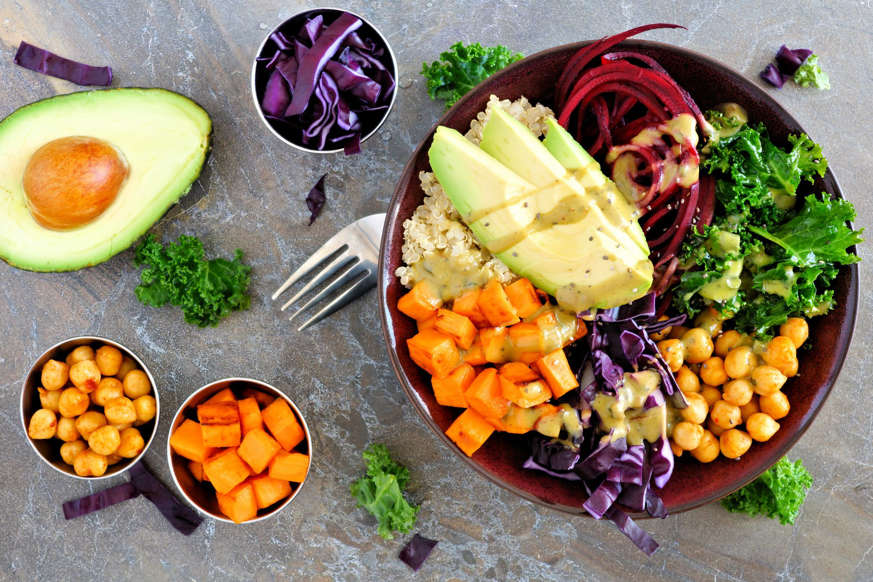The Healthiest Carbs to Add to Your Grocery List

There’s no question that carbs have gotten a bad rap over the years — especially thanks to trendy diet plans like keto. This reputation stems from the fact that the foods with simple, refined carbs are easier to overeat than other good, complex carbs full of fiber and other nutrients.
You’ll find simple carbs in desserts, sugary beverages, condiments, sweetened dairy products, and white, refined grains like rice, pasta, and bread. Foods with sneaky sources of carbs (a.k.a. sugar) are absolutely everywhere — from those aforementioned beverages to energy bars and $16 pressed juices that line supermarket shelves. They're easier to overeat because they get readily absorbed into your bloodstream. What your body doesn’t need, however, gets stored in your peripheral tissues, a.k.a. your fat cells. Doing this regularly over time can lead to weight gain, so that’s why we consider carb-containing foods to be “fattening."
While all carbs break down into glucose, the best carbs for your health are the ones you’ll eat in their closest-to-nature state as possible: vegetables, fruit, pulses, legumes, unsweetened dairy products, and 100% whole grains, like brown rice, quinoa, wheat, and oats. They contain varying amounts of fiber, the beneficial fuel that helps our body’s probiotics to survive and thrive. Dairy products also provide protein in addition to carbs from the naturally occurring sugar lactose.
So how many carbs do we really need? The USDA/DHHS Dietary Guidelines for Americans 2015-2020 recommends that we consume about half of our total calories for the day in the form of carbs. And the more we can choose nutrient-dense foods, the easier it is to actually feel satisfied — and want less of the not-as-nutritious carbs that find their way into our day in sneaky ways. Here’s my list of the healthiest carbs to add to your grocery cart ASAP.
1. Oats
The prebiotic fiber found in oats help fuel your body’s probiotics, the friendly bacteria that lives in your GI tract. Plus, research has linked beta-glucan, a type of soluble fiber found in oats, to lowering cholesterol.
2. Potatoes
Potatoes are nutrient powerhouses — they can pack up to 4 grams of plant-based protein, nearly 5 grams fiber, and 25% of the potassium you need for the day. So long as you’re baking, roasting, grilling, or boiling, you’re in good hands with a trusty tater, be it white, purple, blue, or sweet (a.k.a. orange). Choose ½ of a large or one small potato as your serving size, season as you would any other veg, and you’re good to go.
3. Quinoa
Quinoa is a grain rich in protein, fiber, vitamins, and minerals. What gives it the nutritional leg-up compared to other grains? It’s higher in B-vitamins compared to grains like barley, rye, rice, and corn. These all-important helpers assist in converting the food you eat to the fuel you use for energy.
4. Prunes
Filled with potassium, calcium, and magnesium, prunes are like nature’s gift to our bones (they help make'em stronger); GI tracts (they’ll help you stay regular); and blood pressure (they supply key minerals). Eating dried plums regularly along with other fiber-filled, mineral-packed foods can help decrease your risk of heart disease and type II diabetes — especially since more magnesium in your diet can help you more efficiently metabolize glucose.
5. Pulses
Pulses — the dry edible seeds of beans, lentils, chickpeas, and peas — are everywhere these days, and we couldn’t be happier about it. They're a plant-based protein and packed with fiber, minerals, and B-vitamins, which help your nervous and muscular systems function. One ½ cup serving has about 8 grams of protein that can swap in for meat, which has more saturated fat. Easily the best benefit of pulses is their price. A bag of black beans can cost three times less than chicken, fish, or beef.
6. Pumpkin
One cup of plain pumpkin puree contains more vitamin A than a cup of kale and more potassium than a banana for a mere 83 calories and about half a gram of fat, which makes it a great swap in hash recipes or a lower-calorie veggie side. In addition to its iron content, pumpkin's also packed with beta-carotene, an important antioxidant for your vision and skin. You can get its nutritional benefits year-round in versatile canned form. I love mixing ½ cup into plain, low-fat Greek yogurt (with cinnamon, nutmeg, and a drizzle of honey) for a protein-rich snack.
7. Buckwheat
Buckwheat is a gluten-free seed that’s a staple in Eastern European cuisine, as well as a flour base used in Asian meals and recipes. As a 100% whole grain, the benefits of buckwheat are endless. Use it as a swap for oatmeal at breakfast, instead of rice in stir-frys, and use buckwheat-based Udon as a more nutrient-dense ingredient for traditional egg noodles. It's filled with phytonutrients, fiber, and key antioxidants linked to reducing risk of chronic disease.
8. Tart Cherries
Dried tart cherries provide a slew of phenolic compounds linked to melatonin production, which some research has linked to boosting sleep and aiding in muscle recovery in athletes. Keep in mind that cherry juices — even ones that use stevia in place of sugar — are concentrated sources of naturally occurring sugar. With that said, there’s still plenty of ways to use them in dried form, from breakfast cereal to dessert to yogurt toppings.
9. Taro
Another global staple making its way to us, Taro belongs to the starchy root veggie family and tastes like a potato. It has double the fiber (a cup has nearly 5 grams!) compared to spuds. You can consume it baked — fry form is my personal favorite — and get the immune-boosting antioxidants, minerals, and zinc.
10. Beets
A lesser known fact about beets? They’re a great source of vitamin C, the antioxidant linked to boosting your immune system and helping skin cells to regenerate. They’ll also pack up to 20% of your daily value for folate, the B-vitamin responsible for reducing your risk of cognitive decline. Try them thinly sliced and oven baked, boiled (borscht, anyone?!), or roasted with cayenne, ginger, or turmeric.
11. Yogurt
Yogurt is a great carb choice because it provides lactose, the naturally occurring sugar you get from dairy products. Unsweetened plain Greek yogurt and skyr are your best bets as they're super high in protein and ultra versatile. Try them in sweet-but-tart breakfasts like smoothies and parfaits, or in savory fare like dips and condiments. The greatest attribute of yogurt: its probiotic benefits. Choose kinds that have five strains or more of bacterial cultures per 6-ounce serving.
12. Cassava (Yuca)
If you’re anything like me, you might consider tapioca — the flour derived from the Brazilian cassava root — a forgotten food of the '90s. But today, this white, ultra-starchy wheat substitute is popping up everywhere in the U.S. As a fiber and mineral-containing grain substitute that’s gluten-, dairy-, and nut-free, it can serve as a base for many baking recipes. But keep in mind that cassava is a concentrated source of dietary carbs (great for athletes-in-training!), so while it’s ultra-satisfying and nutrient rich, portion size is key.
13. Bananas
Filled with potassium and magnesium, bananas do double duty by offsetting bloat-inducing salty processed foods and supplying plant-based prebiotic compounds that help "feed" your good bacteria. Snack on one a day with a tablespoon of nut butter, or slice it into morning cereals.
14. Carrots
There’s no question that carrots are nutritious. They’re packed with polyphenols, flavonoids, and carotenoids — all antioxidants linked to major health benefits. But the combo of immune-boosting beta-carotene and fiber with their versatility makes ’em extra special. From roasting and baking (carrot fries are a thing, too!) to snacking on ’em raw (with hummus, tahini, yogurt, guac, or salsa) the possibilities are endless for these orange veggies.
15. The Diet Where Every Meal Feels — and Tastes! — Like a Celebration
Boost your health with the Mediterranean diet made effortless by the Good Housekeeping test kitchen! Skip the counting and planning and instead celebrate good food with triple-tested, nutritionally balanced recipes, daily meal plans, shopping lists, and diet tips that are easy to use.
The post The Healthiest Carbs to Add to Your Grocery List appeared first on Woman's Day

